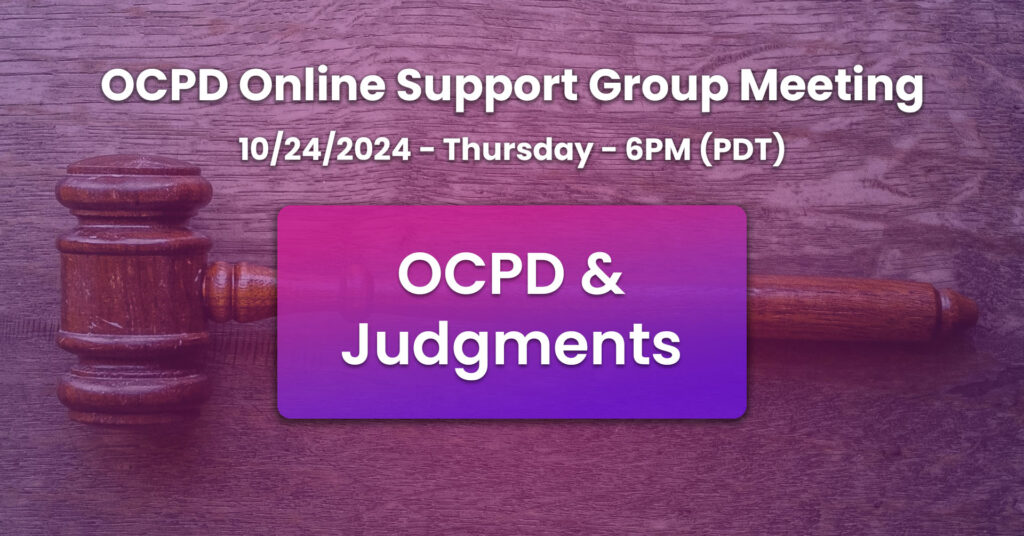When it comes to the 8 diagnostic criteria for OCPD, I feel like it doesn’t take me much effort to find a common thread of “judgment” within each of them. The act of judging feels so pervasive and effortless, so it’s somewhat relieving to know that I’m not alone in this human experience, even if seem to excel at it! (/sarcasm)
judg·ment
the ability to make considered decisions or come to sensible conclusions.
an opinion or conclusion.
a decision of a court or judge.
a misfortune or calamity viewed as a divine punishment.
Personally, I’d like to focus on how, through cultivating mindful awareness, we have the ability to enter into and engage with the world in a less or even non-judging state. I was first introduced to this concept through Acceptance And Commitment Therapy (ACT), where one of its 6 core processes is Being Present.
“Being Present can be understood as the practice of being aware of the present moment, without judging the experience. In other words, it involves experiencing what is happening without trying to predict or change the experience.”
If you have the time, I encourage you to explore the ACT link as well as each of the links below. Unfortunately, I only have the time/energy to provide these little snapshots at this time (and I’m making an effort to not pass a moral judgment/criticism upon myself for those limitations). My hope is that you’re able to engage with these resources to some degree and that they’ll help facilitate our upcoming Zoom meeting discussion. Enjoy!
https://mindvoyage.in/the-psychology-of-judging-others
The Psychology of Judging Others
Judging is Natural
Scientific studies have indicated that judgment is a natural instinct of the human brain. As humans, surviving and thriving are our basic instincts. As a consequence, we automatically end up judging people around us to determine if they are safe to be with. Research conducted at New York University shows that our brain begins to label people trustworthy or untrustworthy even before we get time to consciously analyze their faces. This study highlights the fact that judgment is natural and instinct-based.
https://mindfulambition.net/non-judgment/
Non-Judgment: What is it? And Why Does it Matter? (4 Benefits)
The mind is a judging machine.
Everything that we experience is filtered, categorized, and dealt with in some automatic way.
Some things are judged as “good”, so we grasp for more, and cling to what we have. Other things are judged as “bad”, so we hide, resist, and run away from them. And everything else? That’s judged as “neutral”, so for the most part, we ignore it entirely.
https://www.berkeleywellbeing.com/non-judgement.html
Video: Non-judgment in mindfulness
https://www.berkeleywellbeing.com/non-judgement.html
A Mindfulness Practice for Nonjudgmental Awareness
Explore this 15-minute guided meditation to open up some space for yourself to sit with what is, rather than what if.
“Meditation is the chance to practice giving ourselves permission to feel exactly what we feel, even when we’re not as okay as we’d like to be.”
Reflection Questions
After you’ve had a chance to read through some of the linked articles:
- How often do feel like you’re engaging in judging?
- As you reflect on your own pattern of judging, what does it seem to be motivated by?
- Are there aspects of your life that provoke more or less judging?
- Have you noticed if your judgments are fueled by internal or external expectations or beliefs?
- Have you noticed any shortcomings from your pattern of judging?
- What, if anything, has allowed you to lessen or release judgments?
- How do you think society and your early life experiences have influenced the types of judgments you make?

![[Zoom Meeting] OCPD & Disgust 🤢](https://www.youmeandocpd.com/wp-content/uploads/2023/12/2023-12-14-OCPD-Disgust-1024x536.jpg)
![[Zoom Meeting] Reflecting on the Year 2023 📝🔍](https://www.youmeandocpd.com/wp-content/uploads/2023/12/2023-12-28-OCPD-Reflecting-on-the-Year-1024x536.jpg)